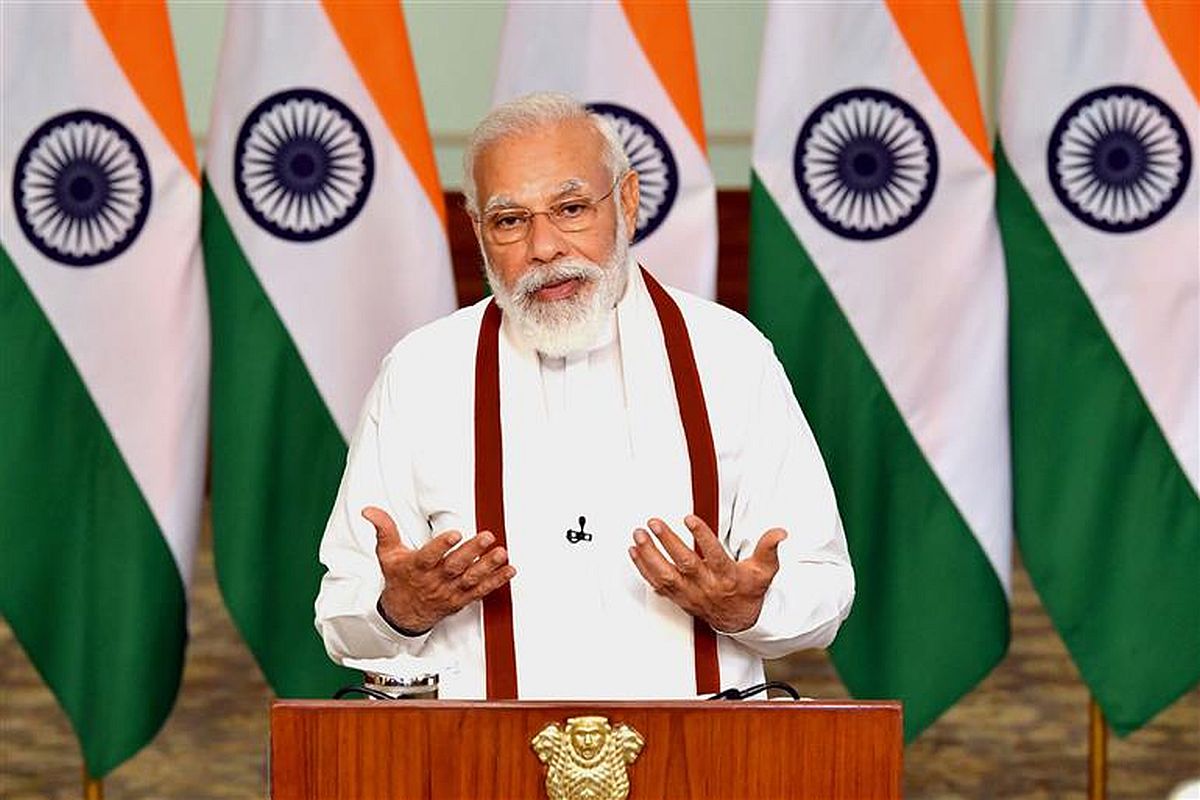K Kavitha questions Modi’s silence on Adani US bribery indictment
Political opponents are arrested without evidence and put on trial for months while Mr Gautam Adani walks free despite repeated and grave allegations, she said.
‘From across the country, daughters have written to me asking why the concerned committee has not given its decision yet. I assure you that as soon as the report comes, the government will act on it,’ PM said.

(Photo: PIB)
A major change seems likely soon in the Constitution as Prime Minister Narendra Modi on Friday assured the daughters of the country that the government will decide the right age for marriage as soon as the concerned committee gives its report.
PM’s remarks came at his address during an event to release a commemorative coin of Rs 75 denomination to mark the 75th Anniversary of India’s long-standing relation with the Food and Agriculture Organisation.
“Discussion is underway to decide the right age for marriage of our daughters. From across the country, daughters have written to me asking why the concerned committee has not given its decision yet. I assure you that as soon as the report comes, the government will act on it,” PM Modi said.
Advertisement
PM spoke about the steps taken by his government towards the maintenance of the health and hygiene of women.
“We are taking appropriate actions for our daughters” well-being. Through Jal Jeevan Mission, work is going on to provide water to every household. We are providing sanitary pad for Re 1 each,” he said.
It is to be noted that the central government on September 22 had said that a task force has been constituted to examine the correlation of the age of marriage and motherhood.
Speaking on the occasion, the Prime Minister greeted the people across the world who are constantly working to remove malnutrition.
He said, our Kisan Saathi – our Annadata, our Agricultural Scientist, our Anganwadi ASHA workers, are the basis of the movement against malnutrition. While they have filled the granary of India with their hard work, they are also helping the government in reaching the poorest of the poor. He added, due to all these efforts, India is fighting a strong fight against malnutrition even in this crisis of Corona.
The Prime Minister said over the years, FAO helped to increase agricultural production and eradicate hunger all over the world, including India and has played a huge role in increasing nutrition and its service is respected by more than 130 crore Indians. He said this year’s Nobel Peace Prize to the World Food Program is also a major achievement for the FAO. He remarked that India is happy with the partnership and engagement which has been historic.
The Prime Minister remarked that with years of experience fresh efforts were made in the country after 2014. He said with an integrated approach Government took a holistic approach and ended all the silos to work on a multi-dimensional strategy.
He listed the initiatives by the Government to fight malnutrition such as National Nutrition Mission (POSHAN Abhiyaan), construction of toilets under Swachh Bharat Mission, Mission Rainbow, Jal Jeevan mission, distribution of low cost Sanitation pads, etc. He highlighted the outcome of such efforts like Gross Enrollment Ratio of girls exceeding the Ratio for boys, etc. He said important work is done to tackle malnutrition like promoting coarse grains and crops rich in nutrition like protein, iron, zinc, etc.
The Prime Minister expressed thanks to FAO for fully supporting India’s proposal to declare 2023 as the International Year of Millets. He said this will encourage intake of nutritious food, increase their availability further and benefit small farmers a lot. He said the small and medium farmers mostly grow coarse grains on their land where there is a problem of water and the land is not so fertile. He added this will benefit not only to India but the whole world.
The Prime Minister said experts around the world were concerned about starvation & malnutrition in India owing to the Corona pandemic. He said amid these concerns, during the past 7-8 months, India has distributed food grains worth about Rs 1.5 crore to the 80 crore poor free of cost, to fight starvation & malnutrition. He added special care was taken to include rice or wheat along with lentils in the ration, as India’s commitment towards food security.
The Prime Minister said to give strength to small farmers, a large network of Farmer Producer Organizations i.e. FPOs are being developed in the country. Grain wastage has always been a major problem in India and amendments in the Essential Commodities Act will change this condition. Now the government as well as private players would get more opportunity to build better infrastructure in villages.
The Prime Minister while elaborating about the amendment to APMC Act, said when the farmer makes an agreement with any private company or industry, the price of the produce will be decided even before sowing. It will also provide relief from the price fluctuations and will encourage new technology in farming.
He added apart from giving more options to the farmer, legal protection has been given to the farmer. If the farmer wants to break the agreement for any reason, then he will not have to pay any penalty. But if the institution that compromises the farmer breaks the agreement, he will have to pay a fine. He said the agreement will be only on the yield and there will not be any kind of crisis on the land of the farmer. That is, every type of protection to the farmer has been ensured through these reforms.
Advertisement